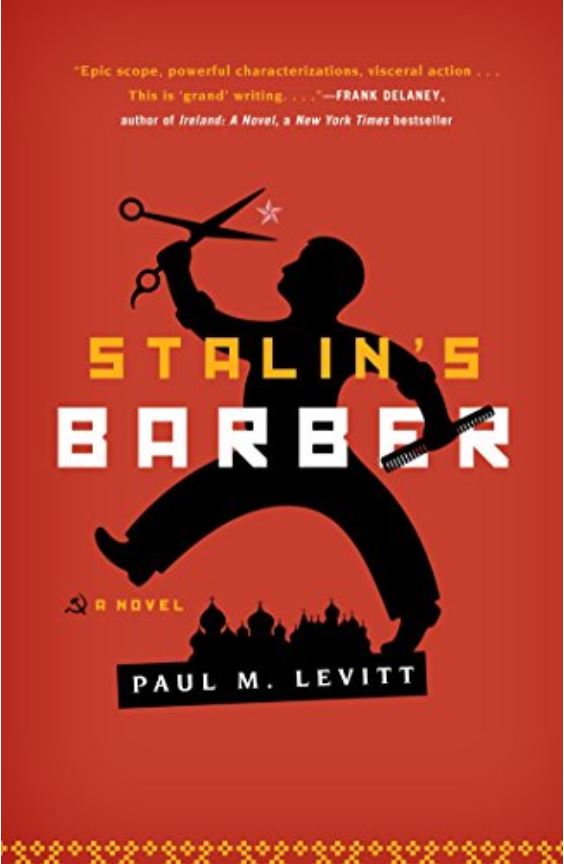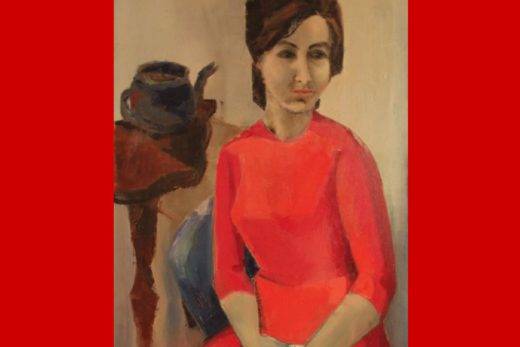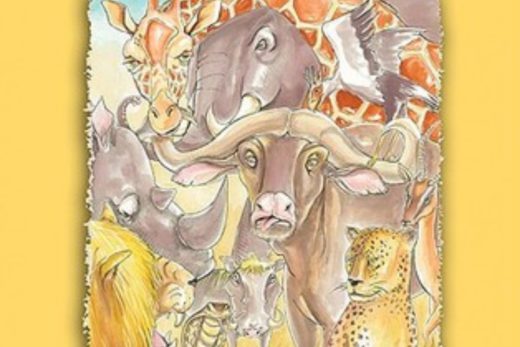
Avraham Bahar leaves debt-ridden and depressed Albania to seek a better life in, ironically, Stalinist Russia. A professional barber, he curries favor with the Communist regime, ultimately being invited to become Stalin’s personal barber at the Kremlin, where he is entitled to live in a government house with other Soviet dignitaries. In the intrigue that follows, Avraham, now known as Razan, is not only barber to Stalin but also to the many Stalin look-alikes that the paranoid dictator circulates to thwart possible assassination attempts—including one from Razan himself.
Reviews
This fascinating novel is easy to admire . . . [it] captures [the] horror [of Stalin’s 1930s Russia] and yet maintains an undercurrent of absurdist humor. . . . Levitt’s powerful narrative variously suggests Chaplin’s Great Dictator, Orwell’s Nineteen Eighty-Four, Voltaire’s Candide, Heller’s Catch-22 and Brecht’s Mother Courage, but remains an entirely original, entirely remarkable work of the imagination.
—The Washington Post
Stalin’s barber is Razeer Shtube, born Avraham Bahar, a Jewish-Albanian immigrant to the worker’s paradise of Soviet Russia. Razeer marries Anna Lipnoskii, the widowed mother of four children, and with the help of her son begins shaving Stalin, or perhaps just one of the Vozhd’s (or Leader’s) rumored doubles. From these auspicious beginnings, Levitt’s novel blossoms as it follows the Shtube clan across Europe, from Poland to Germany, from Italy to the Solovki prison camp, from Soviet Moscow to, finally, freedom; Levitt is ambitiously epic. In his world, Stalin tells Stalin jokes and the panoptic terror of the NKVD corrodes every relationship. With equal parts comedy and tragedy, Levitt vividly illustrates the darkly humorous experience of life in a totalitarian state, where no one can be trusted and the law is removed from reason. Particularly in the first half, the novel tends to sag under the weight of the largesse of its historical research. And occasional odd diction and tonal uncertainty are more common to works in translation. Yet the novel soars when Levitt (The Saint-Makers) brings the strands together in the second half. Razeer’s suspenseful showdown with Stalin is a masterful, playful tease of the limits of historical fiction. (Dec.)
—Publishers Weekly
While Stalin’s Barber serves as an interesting work of fiction, its real value is as a humanized portrayal of history that draws family members and friendships from what might otherwise be an impersonal ledger of atrocities. Stalin’s rule was so brutal and the statistics about his crimes are so vast that telling the story of an individual man among the millions who suffered can be a difficult feat. Paul M. Levitt does it successfully.
—Philosophy of Shaving
Let’s just leave it that this is tale well-told (no surprise, the author is a playwright), full of philosophy and surreal humor, excellent characters, and gripping action, to say nothing of some good history. That the protagonist is a barber offers an exceedingly intimate view of things we might previously have thought to be rather grand scale.
—Russian Life
[Stalin’s Barber is] beautifully written in an effortless prose that is erudite without pretension. I admire it and envy it.
—Sir Arnold Wesker
Barbers are traditionally also bloodletters. The twentieth century has had some spectacular meetings between haircutters and tyrants—Charlie Chaplin’s being the most famous—but here, the field of operations is even wider: from southeastern Europe to starving villages in Russia to doubles in the Kremlin. And just when you think any of it might be real, you turn a corner and meet Nikolai Gogol. A surreal ride.
—Caryl Emerson
Men will tell their barber things they wouldn’t tell their wives, and Stalin was no exception. In a novel as tantalizingly broad as the steppe and a plot as treacherous as the taiga, Paul M. Levitt penetrates to the Soviet heart of darkness. He weaves his tale around a question as dangerous as the razor wielded by the Great Leader’s talented barber—what secrets do these two men share and who, in the end, really holds in his hands the power to change history?
—Peter Kracht
A vivid, imaginative story rich in detailed characterisation which takes the reader on a dark journey laced with black humour into the heart of the USSR at the height of Stalin’s power. Levitt explores a terrifying world of lies, deceit, and half truths; a world of party hacks, informers, and secret police; a world where an innocent phrase, misplaced ‘joke,’ or misinterpreted glance leads to imprisonment, deportation, torture, and murder. Against all the odds, the central character, a Jewish barber, retains his spirit of independence and dreams of ‘freedom’ for himself and his extended family, all of whom suffer at the hands of the State. However, when he is given the job of Stalin’s barber, he seems doomed to certain death. Every time he is summoned, he has to shave Stalin. But who is the man he shaves—is it really ‘The Beloved Leader’ or a double? A disturbing, highly readable insight into the ‘nightmare’ world of the Soviet state
—Martin Jenkins
Stalin’s Barber is all that the great historical novels used to be—epic in scope, with powerful characterizations, visceral action, and a blazingly intelligent authorial point of view. Here we meet—and know—the chief players in the extraordinary centrifuge that was Stalin’s Soviet Union. The culture is revealed and flayed; the lives are displayed and understood—this is ‘grand’ writing, in the sense of ‘grand’ opera, from a man who is already a master playwright, and now deserves to be a world figure.
—Frank Delaney
Readers’ joy in peeling back the layers of this historical novel for themselves. Let’s just leave it that this is tale well told (no surprise the author is a playwright), full of philosophy and surreal humor, excellent characters and gripping action, to say nothing of some good history. That the protagonist is a barber offers an exceedingly intimate view of things we might previously have thought to be rather grand scale.
—Russian Review



